On 24 February 2020, in Geneva, the Minister of Foreign Affairs of Latvia, Edgars Rinkēvičs, took part in a panel discussion among ministers of the United Nations member states on the human rights situation in Crimea.
The Latvian Foreign Minister drew attention to the fact that according to the reports of the Office of the High Commissioner for Human Rights the situation in illegally annexed Crimea has not improved.
“Latvia remains deeply worried about the gross and systemic violations of international human rights and humanitarian law taking place within the sovereign territory of Ukraine. Latvia is particularly concerned by the highly restricted exercise of fundamental freedoms, including freedom of expression, religion or belief as well as freedom of association and the right to peaceful assembly in Crimea. We are alarmed about serious violations and abuses committed against residents of Crimea, in particular extrajudicial killings, violence, enforced disappearances as well as politically motivated prosecutions and discrimination,” Edgars Rinkēvičs underlined.
Minister Rinkēvičs also highlighted the situation of Crimea’s ethnic and religious minorities. “The rights of the Crimean Tatars have been gravely violated through the shutting down of Crimean Tatar media outlets, the banning of the activities of the Mejlis, their self-governing body, and the persecution of its leaders and members of their community. Crimean Tatars, Ukrainians and all ethnic and religious communities in the peninsula must be ensured the possibility to maintain and develop their culture, cultural heritage traditions, education and identity. We strongly condemn the misuse of antiterrorism legislation and other forms of repression against human rights defenders, journalists, media workers and lawyers. Of particular concern are reports about illegal detention of Ukrainian citizens in Crimea and the subsequent deportation to the Russian Federation, as well as torture and ill-treatment inflicted on the detainees. We must remember that remote reporting is likely to illustrate just the “tip of the iceberg” when it comes to the real situation on the ground,” the Minister noted.
The Minister also drew attention to this 18 March being the sixth anniversary of Russia’s illegal annexation of the Autonomous Republic of Crimea and Sevastopol, and asserted that the situation in Crimea getting worse. At the same time, international human rights organizations are still not allowed to monitor the situation in the illegally annexed area.
Edgars Rinkēvičs informed the participants of the ministerial panel discussion that, since 2014, Latvia has provided medical and psychological assistance to 56 Ukrainian soldiers injured in the conflict between Russia and Ukraine. With support from Latvian municipalities, summer camps have been organised for the widows of the fallen soldiers and for children impacted by the conflict. Last December, eleven political prisoners unlawfully detained by Russia and later released visited Latvia, the civic activist and Ukrainian filmmaker Oleg Sencov also among them.
The Minister also recalled that, in May 2019, the Parliament of Latvia (Saeima) recognized the deportations of the Crimean Tatars as genocide, with the Parliament’s statement expressing support for the policy of non-recognition of the illegal annexation of Crimea and condemning Russia's policy of repression and violence against the Crimean Tatars in the occupied Crimea.
The Latvian Foreign Minister said that Latvia will continue to demand proper and unimpeded access of all international and regional human rights monitoring missions and human rights non-governmental organisations to the whole territory of Ukraine, including Crimea and Sevastopol. Latvia will also continue advocating and reminding the international community, and EU Member States in particular, of the human rights situation in Crimea.
In conclusion, Edgars Rinkēvičs reiterated unwavering support of the Government of Latvia for the sovereignty and territorial integrity of Ukraine within its internationally recognized borders.





